Palabras que terminan en ida – ¡Bienvenidos al fascinante mundo de las palabras que terminan en -ida! Estas palabras, que juegan un papel crucial en el idioma español, nos invitan a un viaje de exploración lingüística, descubriendo sus orígenes, funciones gramaticales y matices semánticos.
Desde sus raíces etimológicas hasta su uso estilístico, cada palabra que termina en -ida encierra una historia única. ¡Acompáñanos en esta aventura y sumérgete en el rico tapiz de estas palabras!
Definition of Words Ending in “-ida”: Palabras Que Terminan En Ida
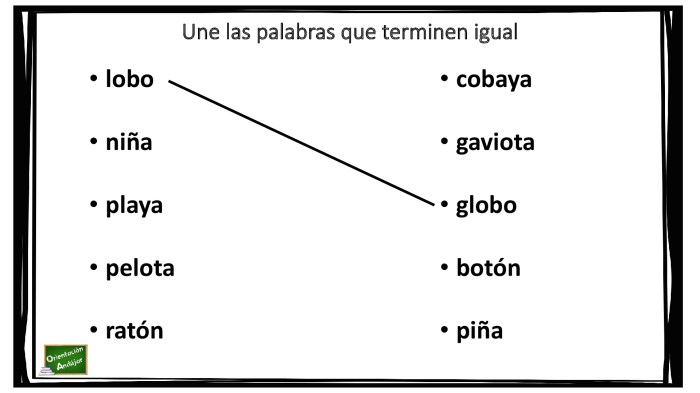
In Spanish, words ending in “-ida” are typically feminine nouns that denote an action or state. They are formed by adding the suffix “-ida” to the root of a verb.
Here are some examples of words ending in “-ida” and their translations:
- comida(food)
- bebida(drink)
- salida(exit)
- entrada(entrance)
- llegada(arrival)
Grammatically, words ending in “-ida” behave like other feminine nouns. They can be used as subjects, objects, or complements in a sentence.
Origins and Etymology
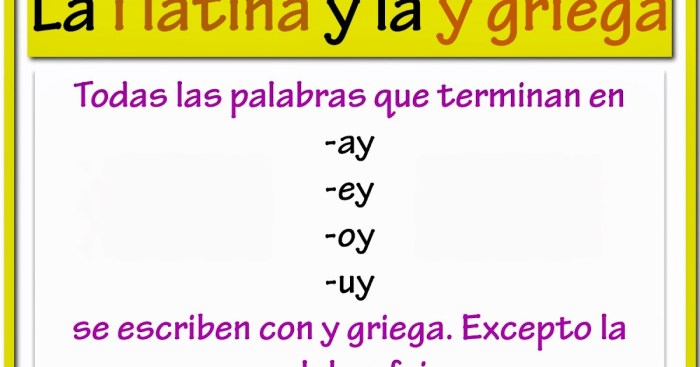
Words ending in “-ida” have a rich and diverse history, tracing their origins to various languages and cultures. These words often carry meanings related to action, condition, or state, and their etymological roots shed light on their evolution over time.
Latin Influence
Many words ending in “-ida” have Latin roots. In Latin, the suffix “-ida” was used to form nouns denoting action, process, or result. This suffix was often added to verb stems, creating words that captured the essence of the verb’s meaning.
For example, the Latin verb “claudere” (to close) gave rise to the noun “clausura” (closure).
Greek Influence
Greek also contributed to the development of words ending in “-ida.” The Greek suffix “-ida” was used to form nouns denoting a condition or state. This suffix was often added to adjectives, creating words that described a particular quality or characteristic.
For example, the Greek adjective “kalos” (beautiful) gave rise to the noun “kallida” (beauty).
Other Influences
In addition to Latin and Greek, other languages have also influenced the development of words ending in “-ida.” For instance, the French suffix “-ide” (derived from Latin) is found in English words such as “suicide” and “homicide.” The Spanish suffix “-ada” (derived from Latin) is found in English words such as “armada” and “serenade.”
Grammatical Function
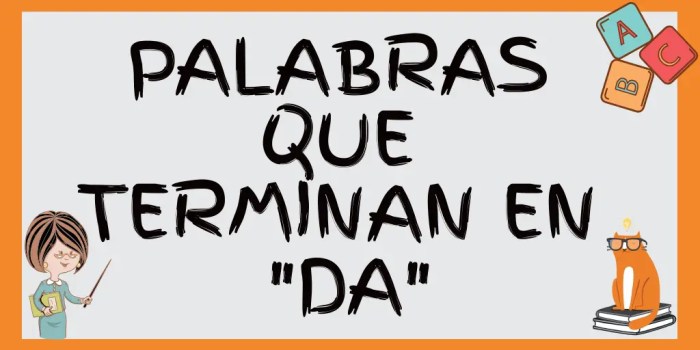
Words ending in “-ida” are adjectives that describe nouns. They typically indicate a quality or characteristic of the noun they modify. In Spanish, adjectives must agree in gender and number with the nouns they describe.
For example, the word “hermosa” (beautiful) is an adjective that can be used to describe a feminine noun, such as “mujer” (woman):
La mujer hermosa es muy amable.
(The beautiful woman is very kind.)
The word “hermoso” can also be used to describe a masculine noun, such as “hombre” (man):
El hombre hermoso es muy guapo.
(The handsome man is very good-looking.)
Palabras que terminan en -ida suelen tener un significado relacionado con una acción o estado, como “comida” o “salida”. Hablando de acciones, ¿sabías que hay una clave de respuestas disponible para el simulador “Cell Energy Gizmo”? Puedes encontrarla en este enlace . Volviendo a las palabras que terminan en -ida, también pueden indicar un lugar o un resultado, como “oficina” o “partida”.
In addition to describing nouns, words ending in “-ida” can also be used as nouns themselves. In this case, they refer to the quality or characteristic that they describe.
For example, the word “belleza” (beauty) is a noun that refers to the quality of being beautiful:
La belleza es una cualidad muy apreciada.
(Beauty is a highly valued quality.)
Semantic Analysis
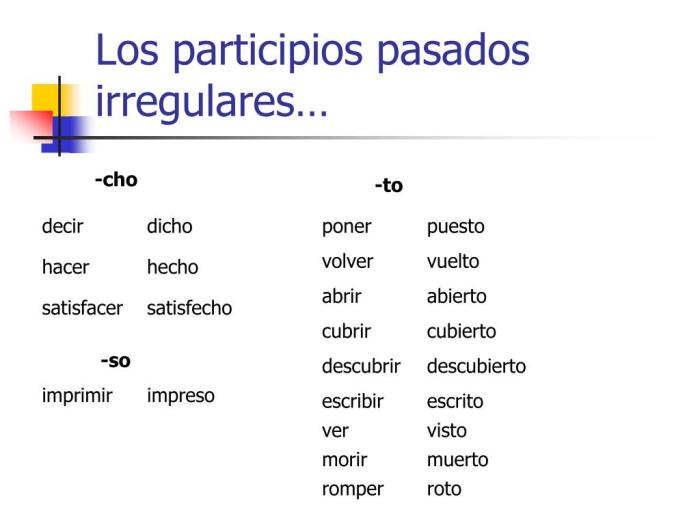
Words ending in “-ida” possess a diverse range of semantic meanings. They often convey a sense of action, process, or state, with subtle variations in their connotations.
One common shade of meaning associated with “-ida” words is that of a completed or accomplished action. For instance, “partida” (departure) implies a completed act of leaving, while “salida” (exit) suggests a specific moment of egress.
Nuances of Meaning, Palabras que terminan en ida
- Actions:“Caída” (fall), “entrada” (entrance), “huida” (flight)
- Processes:“Bebida” (drink), “comida” (food), “partida” (departure)
- States:“Alegría” (joy), “tristeza” (sadness), “victoria” (victory)
Additionally, “-ida” words can convey a sense of result or consequence. “Caída” (fall) implies not only the act of falling but also its aftermath, while “victoria” (victory) encompasses the successful outcome of a competition.
Stylistic Use
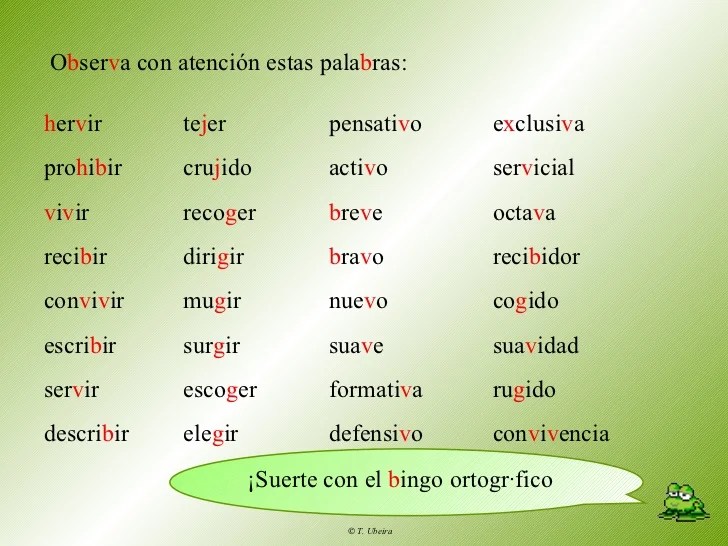
Words ending in “-ida” can be employed strategically to create specific effects in writing. Their distinctive sound and rhythmic quality lend themselves to various stylistic purposes.
Evocative Language
These words often evoke a sense of nostalgia, melancholy, or reflection. Their soft, melodic endings create a wistful tone, as seen in the following excerpt from Federico García Lorca’s poem “Romance de la luna, luna”:
La luna vino a la fraguacon su polisón de nardos. El niño la mira, mira. El niño la está mirando.
Here, the repetition of “-ida” in “fragua” (forge) and “mirada” (gaze) reinforces the sense of longing and contemplation.
Cultural Significance
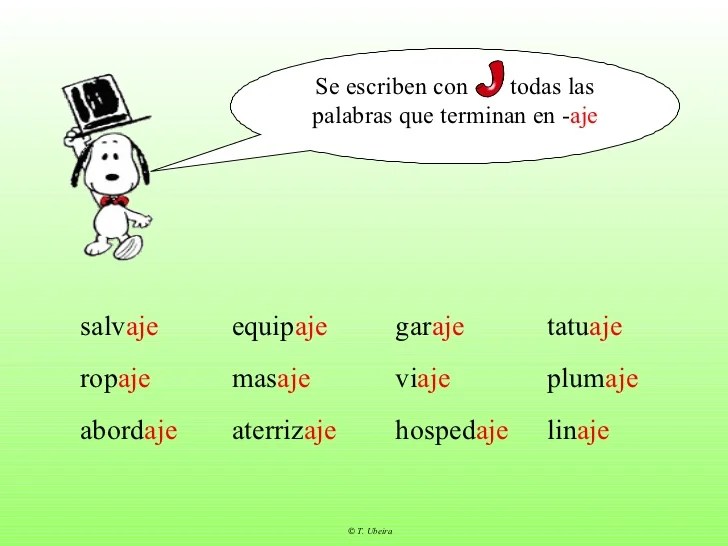
Words ending in “-ida” hold significant cultural importance in Spanish-speaking communities, reflecting the values and beliefs of these cultures. They convey a sense of belonging, community, and shared experiences.
Use in Cultural Contexts
These words are frequently used in cultural contexts, such as:
- Traditional celebrations:“Navidad” (Christmas), “boda” (wedding), “graduación” (graduation)
- Cultural activities:“comida” (food), “música” (music), “pintura” (painting)
- Social interactions:“familia” (family), “amistad” (friendship), “comunidad” (community)
User Queries
¿Qué son las palabras que terminan en-ida?
Las palabras que terminan en -ida son sustantivos femeninos que se forman a partir de verbos y expresan el resultado o efecto de la acción verbal.
¿Cuáles son algunos ejemplos de palabras que terminan en-ida?
Algunos ejemplos incluyen: salida (de salir), llegada (de llegar), comida (de comer), bebida (de beber).
¿Cómo se usan las palabras que terminan en-ida en las oraciones?
Las palabras que terminan en -ida se usan como sustantivos y pueden funcionar como sujeto, objeto directo o indirecto en una oración.